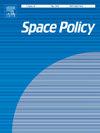新月球太空竞赛中的日本
IF 1.9
4区 社会学
Q2 INTERNATIONAL RELATIONS
引用次数: 0
摘要
在新一轮的月球太空竞赛中,美国和中国最受关注。但其他航天国家对其和平发展也很重要。在本文中,我们关注的是世界上最杰出的太空大国之一的活动,在与月球景观有关的学术和政策圈中,日本仍然没有得到充分的重视。我们概述了日本变化的法律和政策背景,并阐明了日本在天体竞争中定位角色的历史、国际和制度轨迹。最后,我们认为日本的活动对国际空间秩序的繁荣、稳定和领导具有更广泛的意义。本文章由计算机程序翻译,如有差异,请以英文原文为准。
Japan in the New Lunar Space Race
The United States and China draw the most attention in the new lunar space race. But other spacefaring countries are also important to its peaceful evolution. In this paper, we focus on the activities of one of the world's preeminent space powers, which remains underappreciated in academic and policy circles concerned with the lunar landscape—Japan. We provide an overview of Japan's changed law and policy context and illuminate the historical, international, and institutional trajectories that are positioning Japan's role in the unfolding competition over celestial bodies. We conclude with the broader significance of Japan's activities for prosperity, stability, and leadership in the international space order.
求助全文
通过发布文献求助,成功后即可免费获取论文全文。
去求助
来源期刊

Space Policy
Multiple-
CiteScore
3.40
自引率
36.40%
发文量
40
期刊介绍:
Space Policy is an international, interdisciplinary journal which draws on the fields of international relations, economics, history, aerospace studies, security studies, development studies, political science and ethics to provide discussion and analysis of space activities in their political, economic, industrial, legal, cultural and social contexts. Alongside full-length papers, which are subject to a double-blind peer review system, the journal publishes opinion pieces, case studies and short reports and, in so doing, it aims to provide a forum for the exchange of ideas and opinions and a means by which authors can alert policy makers and international organizations to their views. Space Policy is also a journal of record, reproducing, in whole or part, official documents such as treaties, space agency plans or government reports relevant to the space community. Views expressed in the journal are not necessarily those of the editors or members of the editorial board.
 求助内容:
求助内容: 应助结果提醒方式:
应助结果提醒方式:


